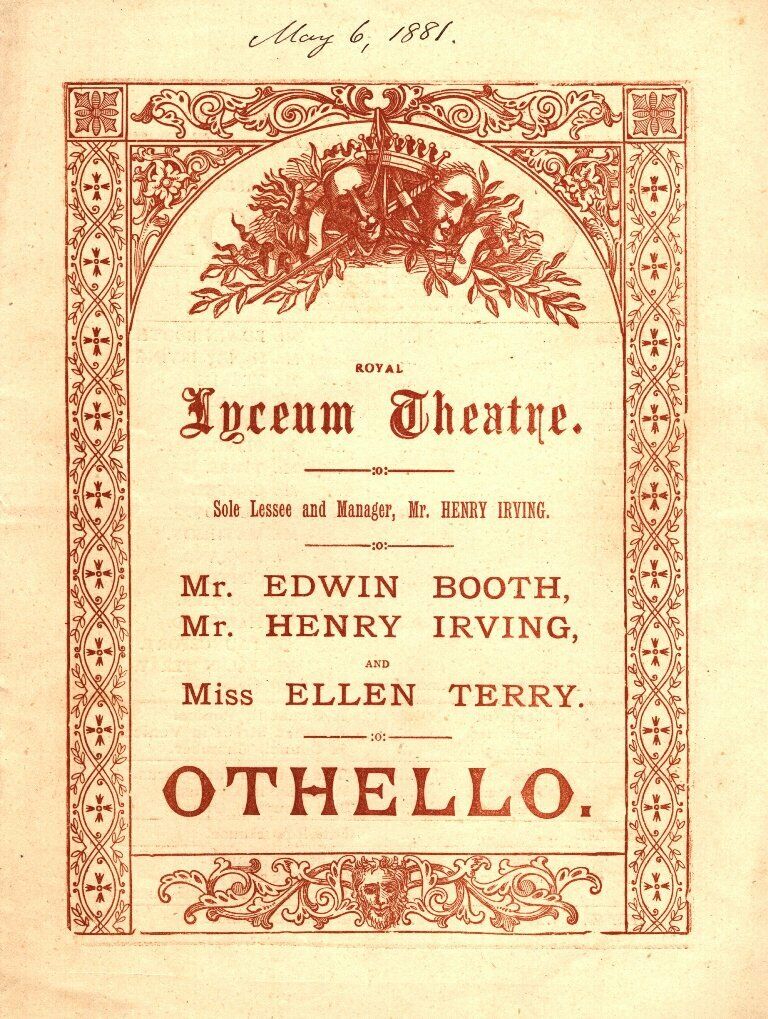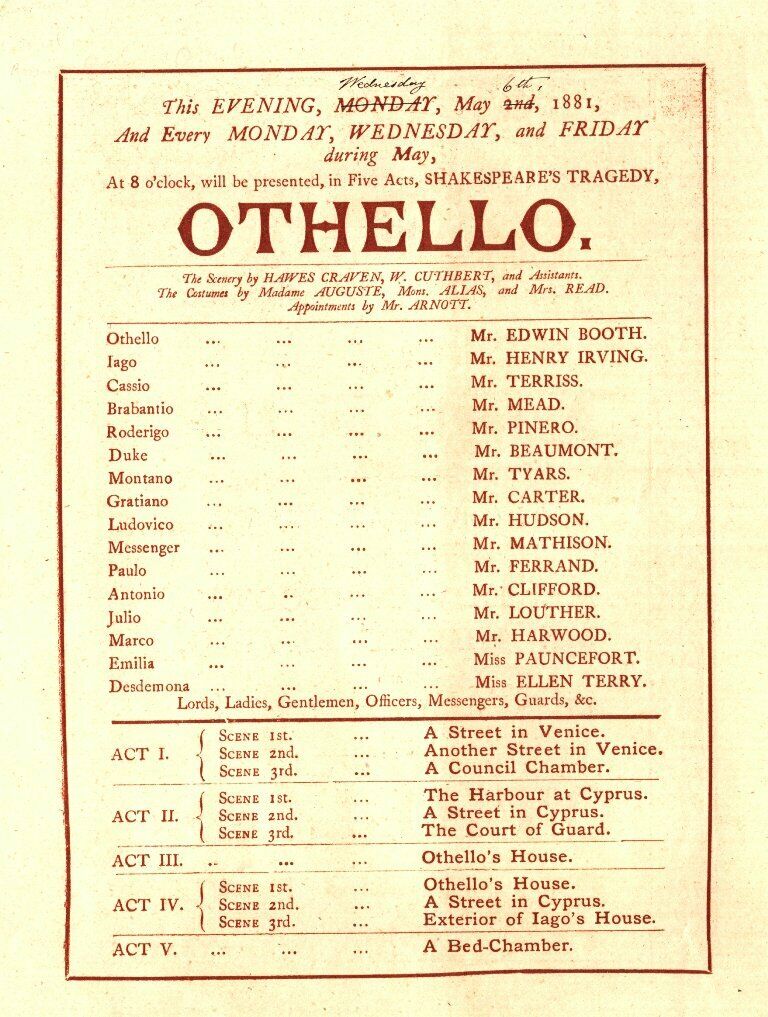-40%
*STAGE LEGENDS EDWIN BOOTH HENRY IRVING ELLEN TERRY RARE 1881 OTHELLO PROGRAM*
$ 105.59
- Description
- Size Guide
Description
It's one of the most historic productions in the history of the stage. A rare original May 6, 1881 second night program for Edwin Booth, Henry Irving, and Ellen Terry in Othello at the Lyceum Theatre. Booth and Irving alternated Othello and Iago, with Booth here playing Othello in the first week of the run. Future playwright Arthur Wing Pinero plays Roderigo. Future Dracula author Bram Stoker is listed as acting manager. Four pages. Dimensions eight and a quarter by six and a quarter inches. Light wear, light fold, and soiling otherwise good.See the Edwin Booth, Henry Irving, and Ellen Terry's extraordinary biographies below.
Ships first class insured in US and airmail overseas. Shipping discounts for multiple purchases. Inquiries always welcome. Please visit my other eBay items for more early theatre, opera, film, magic, and historical autographs, photographs, programs and broadsides and great actor and actress cabinet photos and CDV's.
From Wikipedia:
The Booth family was an English-American theatrical family of the 19th century. Its most famous and well known members were Edwin Booth, one of the leading actors of his day, and John Wilkes Booth, who assassinated Abraham Lincoln.
The patriarch was Junius Brutus Booth, a London-born lawyer's son who eventually became an actor after he attended a production of Othello at the Covent Garden theatre. The prospects of fame, fortune and freedom were very appealing to young Booth, and he displayed remarkable talent from an early age, deciding on a career in the theatre by the age of seventeen. He performed roles in several small theaters throughout England, and joined a tour of the Low Countries in 1814, returning the following year to make his London debut.
Booth abandoned his wife and their young son in 1821 and ran off to the United States with Mary Ann Holmes, a London flower girl. They settled in Harford County near Baltimore, and built a house named "Tudor Hall" in 1847, which still survives. There they started a family; they had ten children, six of whom survived to adulthood.[1][2]
Junius Sr. and Edwin toured the Western United States during the Gold Rush, performing plays by Shakespeare for illiterate miners, who nevertheless had no tolerance for bad acting. Edwin Booth bought an interest in the Winter Garden Theatre at 667 Broadway in New York City together with his brother-in-law John Sleeper Clarke. The brothers John Wilkes, Edwin, and Junius Brutus, Jr. performed there in the play Julius Caesar at a benefit in 1864, the only time they were seen together on a stage, playing Mark Antony, Brutus and Cassius, respectively.
Edwin Thomas Booth (November 13, 1833 – June 7, 1893) was a famous 19th-century American actor who toured throughout America and the major capitals of Europe, performing Shakespearean plays. In 1869 he founded Booth's Theatre in New York, a spectacular theatre that was quite modern for its time.[2] Some theatrical historians consider him the greatest American actor, and the greatest Hamlet, of the 19th century.[3] However, his achievements are often overshadowed by his relationship with his brother, John Wilkes Booth, the man who assassinated President Abraham Lincoln.
Sir Henry Irving
(6 February 1838 – 13 October 1905), born
John Henry Brodribb
, sometimes known as
J. H. Irving
, was an English stage actor in the
Victorian era
, known as an
actor-manager
because he took complete responsibility (supervision of sets, lighting, direction, casting, as well as playing the leading roles) for season after season at the
Lyceum Theatre
, establishing himself and his company as representative of English classical theatre. In 1895 he became the first actor to be awarded a
knighthood
, indicating full acceptance into the higher circles of British society.
Irving is widely acknowledged to be one of the inspirations for
Count Dracula
, the title character of the 1897 novel
Dracula
whose author,
Bram Stoker
, was business manager of the theatre.
Dame Alice Ellen Terry
,
GBE
(27 February 1847
[1]
– 21 July 1928), known professionally as
Ellen Terry
,
[2]
was a renowned English actress of the late 19th and early 20th centuries.
Born into a
family of actors
, Terry began performing as a child, acting in Shakespeare plays in London, and toured throughout the British provinces in her teens. At 16, she married the 46-year-old artist
George Frederic Watts
, but they separated within a year. She soon returned to the stage but began a relationship with the architect
Edward William Godwin
and retired from the stage for six years. She resumed acting in 1874 and was immediately acclaimed for her portrayal of roles in Shakespeare and other classics.
In 1878 she joined
Henry Irving
's company as his leading lady, and for more than the next two decades she was considered the leading Shakespearean and comic actress in Britain. Two of her most famous roles were Portia in
The Merchant of Venice
and Beatrice in
Much Ado About Nothing
. She and Irving also toured with great success in America and Britain.
In 1903 Terry took over management of London's
Imperial Theatre
, focusing on the plays of
George Bernard Shaw
and
Henrik Ibsen
. The venture was a financial failure, and Terry turned to touring and lecturing. She continued to find success on stage until 1920, while also appearing in films from 1916 to 1922. Her career lasted nearly seven decades.











